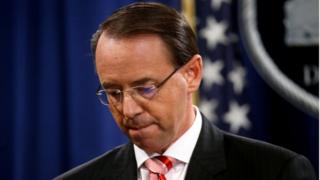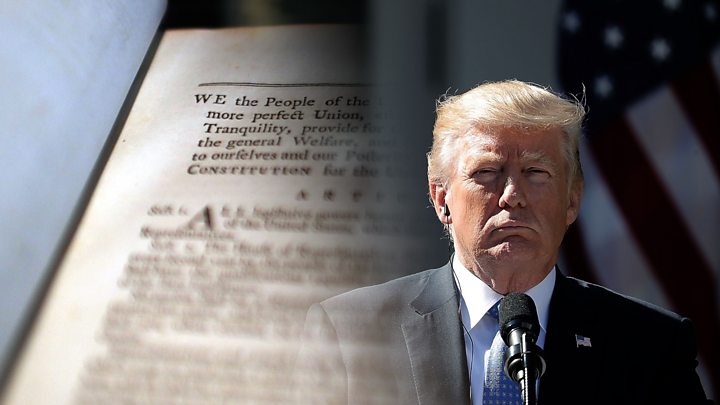 Image copyright
Reuters
Image copyright
Reuters
US Deputy Attorney General Rod Rosenstein has visited the White House amid reports he is expecting to be fired.
It follows a report that America's second most senior law official talked last year about ousting Mr Trump and secretly recording him.
In a radio interview aired on Monday, Mr Trump said he had not decided whether to fire Mr Rosenstein.
Mr Rosenstein oversees special counsel Robert Mueller's Trump-Russia inquiry.
If Mr Rosenstein did lose his job, another Department of Justice official, the solicitor general, would be in line to take over supervision of the investigation into whether there was any collusion between Moscow and the Trump campaign before the 2016 election.
Mr Rosenstein assumed oversight of the inquiry after his boss, Attorney General Jeff Sessions, recused himself when it emerged he had been in contact with Russia's ambassador to Washington while serving as a Trump campaign adviser.

A source close to Mr Rosenstein said "he's expecting to be fired" and had verbally resigned to White House Chief of Staff John Kelly, Axios reported on Monday.
But a source told Reuters news agency that Mr Rosenstein had not resigned, though the subject did come up in a conversation he had with Mr Kelly over the weekend.
Mr Rosenstein's White House meeting on Monday had been previously scheduled, a person familiar with the matter told the news agency.
On Friday, the New York Times reported that Mr Rosenstein had discussed recruiting cabinet members to invoke a US constitutional clause that provides for the removal of a president if deemed unfit for office.
According to the newspaper, the deputy attorney general had also suggested surreptitiously taping the president in order to expose the chaos in the White House.
Mr Rosenstein denied the claims, and a Department of Justice spokesperson told the BBC the secret recording remark was just a joke.
The deputy attorney general was said to have made the remarks after Mr Trump fired FBI Director James Comey in May 2017.
Without Rosenstein, Russia inquiry in doubt
Analysis by Anthony Zurcher, BBC Washington
If Rod Rosenstein is out, by resignation or firing, the future of Robert Mueller's special counsel investigation is very much in doubt.
Mr Rosenstein is the reason there is a special counsel investigation, and he has given Mr Mueller a wide mandate to pursue that inquiry wherever it may lead.
It has resulted, for instance, in the successful prosecution of former Trump campaign chair Paul Manafort and a plea deal from Donald Trump's personal lawyer Michael Cohen - both for activities tangential to the Russia probe.
A different person in charge might have nipped those moves in the bud.
Whoever took over if Mr Rosenstein departed - at the moment, Solicitor General Noel Francisco - could decide to curtail the scope of the investigation or push for a speedy resolution.
At the very least, Mr Francisco will assume the oversight duties knowing full well the president is watching very closely and has no hesitation going on the attack - even against members of his own administration - if he feels in any way slighted or wronged.
As Mr Rosenstein will surely attest, it is an unenviable position.
Mr Trump - who was in New York on Monday for a meeting of the UN General Assembly - spoke about the deputy attorney general over the weekend.
"We will make a determination," the Republican president told Fox News in the radio interview, which was broadcast on Monday. "It's certainly a very sad story."
"I haven't gotten all the facts, but certainly it's being looked at in terms of what took place - If anything took place."
"And I'll make a determination sometime later, but I don't have the facts."
The president has repeatedly referred to the special counsel's investigation as a politically motivated witch hunt.
Sean Hannity, a Fox News host and friend of Mr Trump, has urged him to not fire Mr Rosenstein, warning he would fall into a trap laid by his political enemies.
Mid-term elections are looming on 6 November, when Republicans will try to keep control of the US Congress.
Under the Federal Vacancies Act, Mr Trump might be able to appoint a temporary replacement for the deputy attorney general - if he resigned.
If Mr Rosenstein was to be fired, however, the process would be less clear.